Don't wanna be here? Send us removal request.
Photo
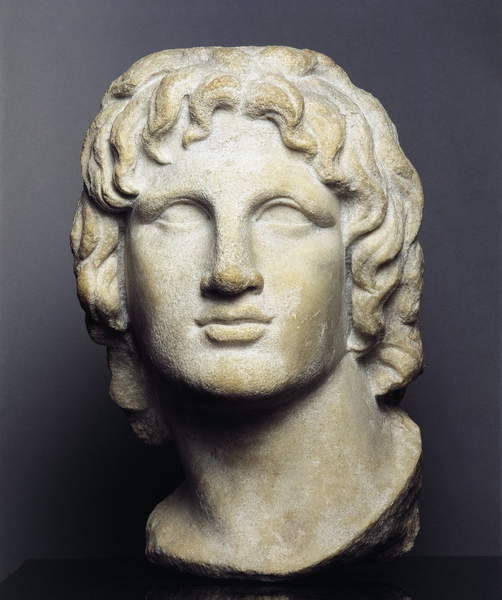
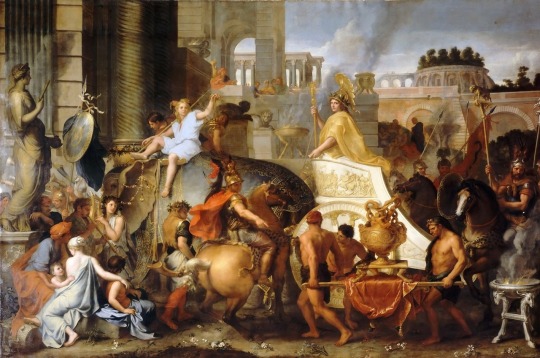
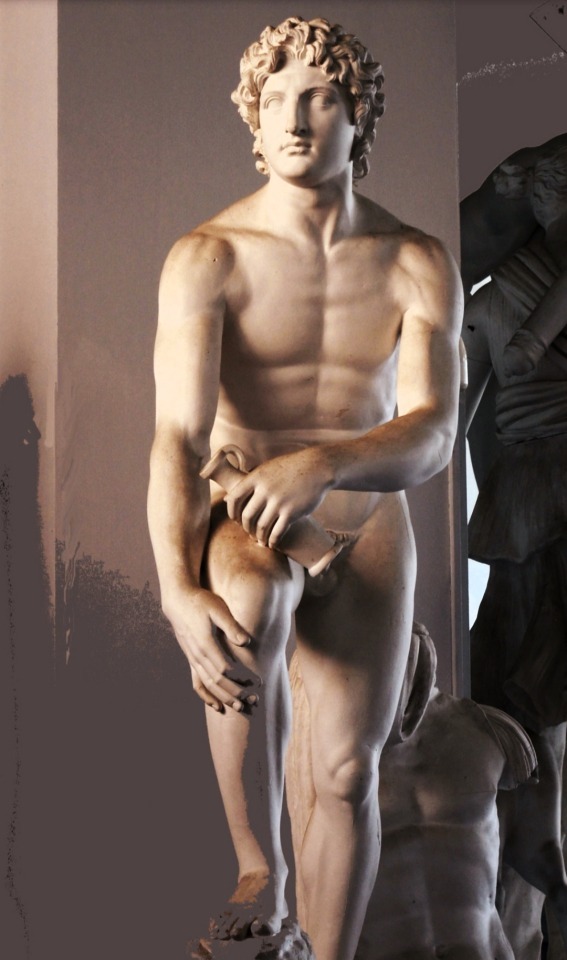
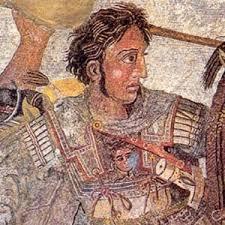
Born in 356 B.C., Alexander the Great is known in history as one of the world’s greatest military minds. Historians also claim he was quite easy on the eyes. Although born as the son of King Philip II and Queen Olympia, Alexander believed that he was instead the son of the Greek God, Zeus, because of his divine ancestry. In his short 13 years as king, Alexander was able to conquer over 2 million square miles of land to establish the largest empire of the Ancient World. His reign stretched from Greece, through the Middle East, to central Asia and India. Spreading Greek culture, language, and thought, Alexander is accredited with influencing the following Hellenistic World with Greek culture.

Tutored academically by Aristotle and in warfare by his father, Alexander the Great was a powerful imperialist. His time with Aristotle ensured for exemplary intellectual abilities; paired with his intense military training, Alexander became an impeccable leader that conquered any land that he desired. Alongside Alexander for most of his reign were Bacephalus, his horse, and friend Hephaestion.
At the age of 16, Alexander was left to rule over the kingdom of Macedonia when his father went to battle with the Byzantine Empire. In this time, Alexander led a cavalry and decimated the Sacred Band of Thebes during the Battle of Chaeronea. This event was the start of Alexander’s military vigor and brilliance. Around two years later in 336 B.C., Alexander’s father was assassinated by his own bodyguard, leaving Alexander the heir to the throne at the age of 20. Alexander was quick to defeat anyone that would keep him from claiming the throne. Following in his father’s footsteps, Alexander continued “world domination.”

Alexander’s first battle as king began by capturing Persia and destroying the Persian and Greek army. From Persia, Alexander headed south to Sardes and easily took control over the city. He and his army faced resistance in the cities Miletus, Mylasa, and Helicarnassus; Alexander was able to take control over two of the three entirely. Halicarnassus was a little more difficult to conquer as King Darius III amassed a significant army. Alexander and King Darius III met again near Issus in southern Turkey in 333 B.C. where Alexander easily defeated the army. King Darius III fled before Alexander was able to kill him. Alexander’s claim to Persia’s great wealth was established here.

From here, Alexander went to take over Marathus and Aradus, two Phoenician cities. He went to take two other towns, Byblons and Sidon, before attempting to attack the island of Tyre in 332 B.C. The city was surrounded by water, making it difficult for Alexander to have the upper hand as he had no established navy. After a few months of trial and error, Alexander penetrated Tyre, where he executed and sold thousands of civilians for defying his rule.
Hungry for more territory, Alexander set out for Egypt. Like the city of Tyre, Gaza was difficult to capture. Alexander spent several weeks with Gaza under siege before finally claiming victory. After this siege, he entered Egypt and established the city of Alexandria. Of all his conquests, Alexander named 70 cities after himself. After conquering Egypt, Alexander met King Darius III again at Gaugamela in 331 B.C. Defeat came easy, and Alexander was finally able to claim the Persian throne. To gain credibility with the Persians, Alexander adopted Persian customs. His dress was of Persian culture, and he even went as far as practicing proskynesis, a Persian custom where one bowed and kissed the hand of others depending on their rank.
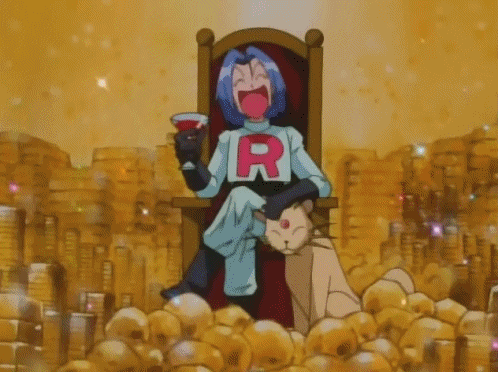
Many Macedonians were not pleased by Alexander’s decision to take on Persian customs and culture. Many of the Macedonian civilians have been thought to have planned Alexander’s death. Due to this, Alexander became increasingly paranoid and began killing any individual that he believed posed a threat to him or his rule. This began first with Parmerio, an esteemed general, and his son; Parmerio’s son was convicted of plotting Alexander’s assassination. Alexander also killed his close friend, Cleitus, after being insulted and his achievements minimized.

Alexander struggled to capture a region of the Persian Empire, Sogdia, but upon remaining persistant, he eventually was able to claim rule. From here, Alexander moved on to conquer India. Some tribes were easy to overtake while others proved to be more difficult. His beloved horse was killed during an attempt to conquer territory. Devastated, Alexander named the city of Bucephala after his horse. Wishing to conquer all of India, Alexander’s soldiers were weary. Because of this, Alexander retreated back to Persia. With plans to conquer more territory, Alexander died in June of 323 B.C. His death is unknown in cause, although there are some speculations – malaria, infection, and poisoning. Alexander never named a successor. Shortly after his death, his great empire that he had worked so hard to create crumbled.
What’s so great about Alexander the Great? Could it be his desire to name almost every conquered city after himself? Much of the land Alexander conquered retained the Greek influence Alexander introduced. This influence can be found even today in many modern cities. After his death, his legacy influenced the Hellenistic Period, derived from “Hellazein,” which means, “to speak Greek or identify with the Greeks.” Alexander the Great is known as one of the most influential and powerful leaders of the Ancient World.


On a different note, I have included gifs that are funny moments that could be used to illustrate Alexander’s thought process. I have also compiled a Twitter of Alexander the Great. I imagine that his tweets would have been eerily similar.
Sources:
(https://www.ancient.eu/article/925/alexander-the-great-as-a-god/)
https://www.history.com/news/alexander-the-great-defeat-persian-empire
https://www.ancient.eu/article/925/alexander-the-great-as-a-god/
Briant, P. Alexander the Great and His Empire. (Princeton University Press, 2012).
Primary sources were taken from some secondary sources (:
2 notes
·
View notes
Photo
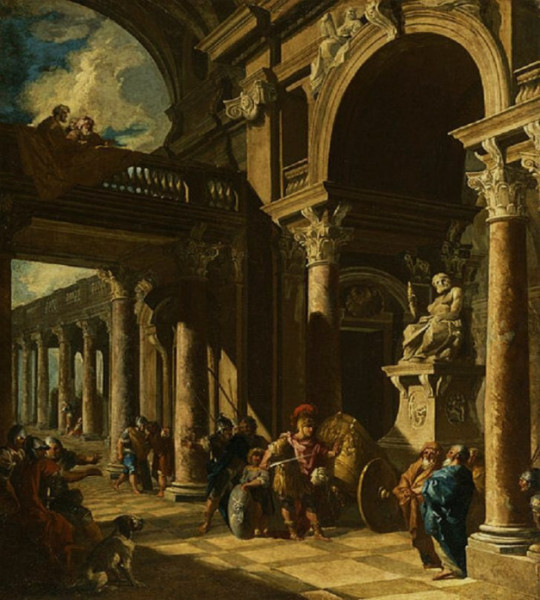
Alexander The Great Cutting the Gordian Knot by Giovanni Paulo Panini (1691-1765), between 1718-1719, Baroque, Oil on canvas, 73, 3 cm x 59,7 cm, Walters Art Museum The Macedonian ruler and general have entered the town of Gordium (in present-day Turkey) in 344 BC. In that city was the chariot of Gordius, the father of the legendary King Midas. The yoke of the wagon was fastened by a complicated knot. It had been prophesied that the one who could loose the knot would become the ruler of Asia. Instead of trying to untie the impossibly difficult knot, Alexander just cuts it with his sword. He went on to conquer Asian kingdoms as far east as Afghanistan. To suggest Asia Minor and the ancient past, Panini introduced a bystander wearing a turban and placed the scene in front of an altar dedicated to Zeus, ruler of the Greek gods, enthroned with his thunderbolt.
140 notes
·
View notes
Quote
Tears burst from his eyes, and trickled down on the throat of Alexander, who, believing he too felt the after sadness, smilingly stroked his hair. In our souls,’ he said, ‘we’ll be more than ever united, winning eternal fame. Son of Menoitios, great one, you who delight my heart.’ He smiled deeply into Hephaistion’s eyes, which faithfully smiled back
Fire from Heaven (via henrythexsixth)
254 notes
·
View notes
Text
Me having the same password for every account I have is the same thing as Alexander the Great naming all major cities he conquered after himself.
155 notes
·
View notes
Text
No matter how drunk you get, you’ll never go on a bender as wild as Alexander the Great and burn a city to the ground.
218 notes
·
View notes
Text
The Macedonians: Hey, Alexander, you really don’t need to go through the Gedrosian Desert, it’s not even really on our way and there’s a chance lots of us will die- Alexander the Great:

305 notes
·
View notes
Text
Petition to Rename Alexander the Great “Alexander the Here for a Good Time not a Long Time”
237 notes
·
View notes
Text
general: what will we name this one sir?
alexander the great: take a fuckin’ wild guess
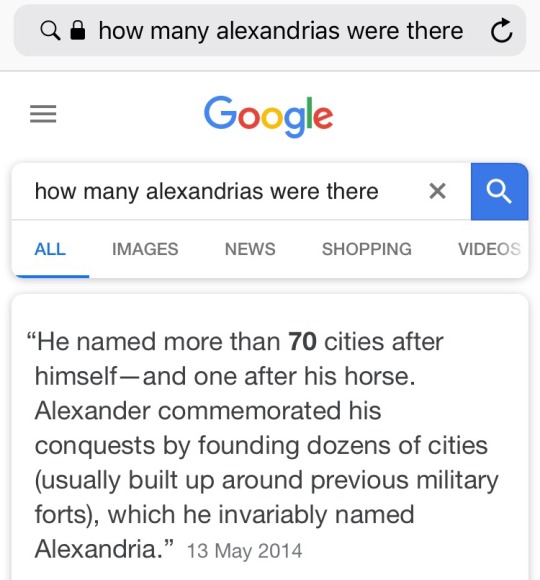
5K notes
·
View notes
Quote
When Hephaestion died Alexander threw armour on to his pyre, and melted down with the corpse gold, silver, and clothing much prized by the Persians. He cut off his own hair, a gesture in the Homeric manner, in imitation of the poet’s Achilles. But Alexander was more violent and hotheaded than Achilles: he destroyed the acropolis at Ecbatana and knocked down its walls. As far as his hair is concerned, I think he acted in accordance with Greek custom; but when he pulled down the walls, that was a barbaric expression of grief by Alexander. He changed his dress and allowed himself to be completely controlled by anger, love, and tears.
Aelian, Historical Miscellany.
[Ὅτε Ἡφαιστίων ἀπέθανεν, Ἀλέξανδρος ὅπλα αὐτῷ εἰς τὴν πυρὰν ἐνέβαλε, καὶ χρυσὸν καὶ ἄργυρον τῷ νεκρῷ συνέτηξε καὶ ἐσθῆτα τὴν μέγα τιμίαν ἐν Πέρσαις. ἀπέκειρε δὲ καὶ τοὺς πλοκάμους τοὺς ἑαυτοῦ, Ὁμηρικὸν πάθος δρῶν καὶ μιμούμενος τὸν Ἀχιλλέα τὸν ἐκείνου. βιαιότερον δὲ καὶ θερμότερον ἐκείνου ἔδρασεν οὗτος, τὴν τῶν Ἐκβατάνων ἀκρόπολιν περικείρας καὶ τὸ τεῖχος αὐτῆς ἀφελόμενος. μέχρι μὲν οὖν τῆς κόμης τῆς ἑαυτοῦ Ἑλληνικὰ ἐδόκει μοι δρᾶν· ἐπιχειρήσας δὲ τοῖς τείχεσιν, ἀλλ᾿ ἐνταῦθα ἐπένθει βαρβαρικῶς Ἀλέξανδρος ἤδη, καὶ τὰ κατὰ τὴν στολὴν ἤμειψε, θυμῷ καὶ ἔρωτι ἐπιτρέπων πάντα καὶ δακρύοις.]
(via speciesbarocus)
430 notes
·
View notes
Text
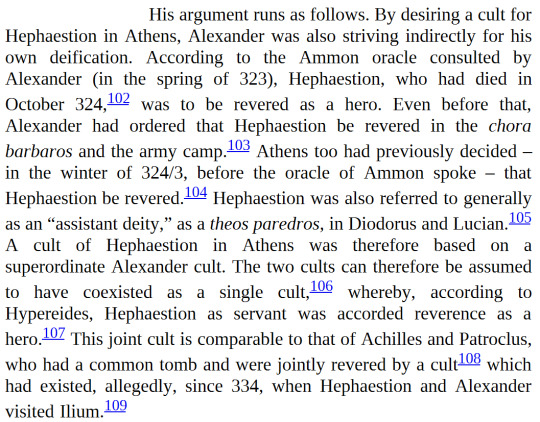
Some historians: “Hephaestion who? We don’t have enough information to determine his true importance in Alexander’s life.”
Alexander the Great himself: “We shall be gods together and you shall revere us as one or not at all”.
208 notes
·
View notes
Photo
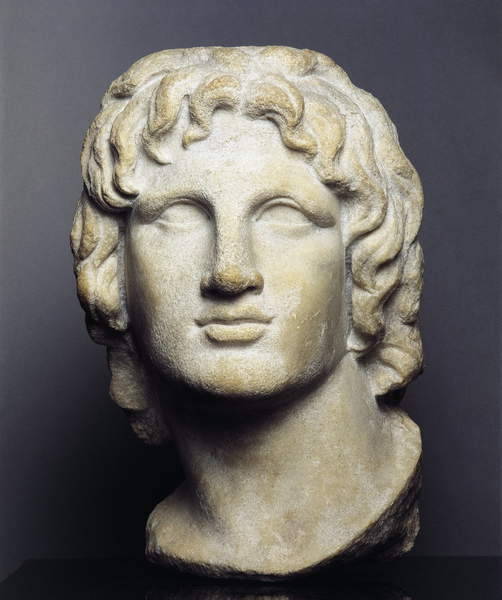
Marble head of Alexander the Great, probably from Alexandria. Hellenistic/Ptolemaic Period, 2nd-1st century BC. Now in the British Museum. Photo: Sandro Vannini
315 notes
·
View notes
Photo

The Empire of Alexander the Great.
343 notes
·
View notes
Text
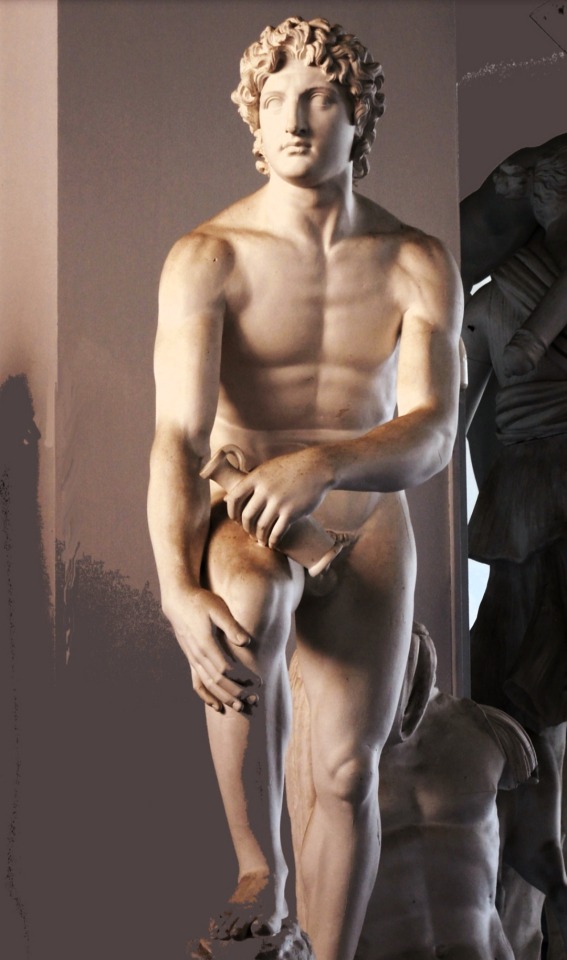
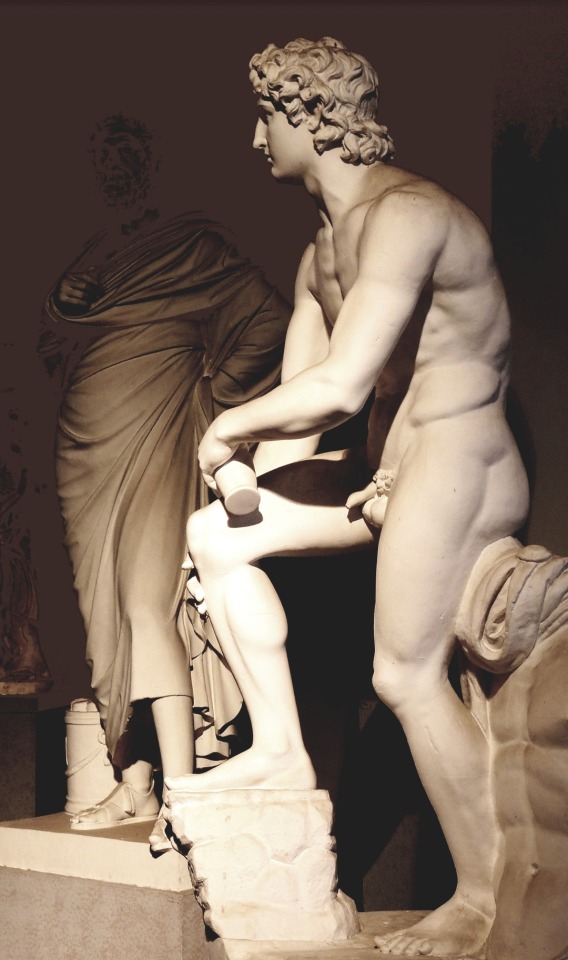
Alexander Rondanini
Copy from the part of a Roman period copy of a bronze statue group by Euphranor of Corinth.
Mentioned by Pliny the Elder, depicting King Philip II of Macedon and his son Alexander in four-horse chariots.
- Museum Of Classical Art Sapienza University, Rome.
405 notes
·
View notes
Photo
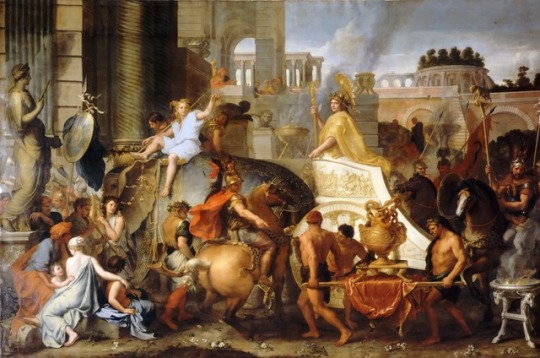
Entry of Alexander into Babylon, or the Triumph of Alexander, Charles Le Brun, 1665
458 notes
·
View notes
Conversation
alexander: welcome my friends whom i love, i gathered you here today so you can tell me your opinion on this thing, please speak freely without fear!! i'm open to everything and anyone :) please just say
literally any general: well i mean maybe we should j
alexander: what the fuck???? excuse me what the fuck??? are you stupid or you just don't understand anything relating to war at all??? how dare you speak to me i don't deserve this i hate all of you
461 notes
·
View notes
Text
Alexander the Great to himself when he had to leave India: this is so sad Alex
573 notes
·
View notes
